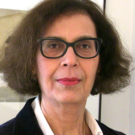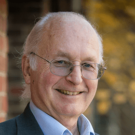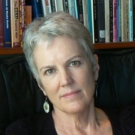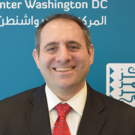Speakers

Khaled Elgindy
Fellow at the Center for Middle East Policy
The Brookings Institution

Nadia Hijab
Executive Director
Al-Shabaka: The Palestinian Policy Network

William Quandt
Scholar and Professor of Middle East Politics
University of Virginia

Virginia Tilley
Professor of Political Science
Southern Illinois University-Carbondale
Moderator
Event Summary
On June 6, 2017, the Arab Center Washington (ACW) hosted a panel of experts to discuss the current situation and the future of Palestine and the Palestinians. Introducing the program, ACW’s Executive Director, Khalil Jahshan, remarked that in looking at the fifty years since the June 1967 War, one discerns many changes and developments in the conflict, yet there are some intransigent realities. The world is still trying to find a political solution to the Israeli-Palestinian impasse. The new Trump Administration, he added, is not likely capable of changing this scenario. For its part, the Palestinian leadership has failed in formulating a successful strategy, as the Israelis continue their illegal settlement building. “It is largely accepted by many in the field,” he said, “that the concept of two states has become virtually impossible to realize. The Israeli occupation has become even more entrenched and Israeli leaders make contradictory statements about exchanging land for peace.”
Yousef Munayyer, Executive Director of the US Campaign for Palestinian Rights and an analyst at ACW, served as moderator of the session. He noted that not only is this the 50th anniversary of the June 1967 War, but also the 100th year since the Balfour Declaration, 70 years since the UN partition of Palestine, 35 years since the Sabra and Shatila massacres, and 10 years since tightening of the siege on the Gaza Strip.
The first speaker was Virginia Tilley, a professor of political science at Southern Illinois University-Carbondale and, with Richard Falk, served as the coauthor of the March 2017 report for the UN Economic and Social Commission for Western Asia (ESCWA) titled, “Israeli Practices towards the Palestinian People and the Question of Apartheid.” She opened by saying that this 50th anniversary compels us to assess the current situation and search for a paradigm shift in order to move things forward. “International law,” she stated, “calls Israel’s presence in the West Bank, Gaza, East Jerusalem, and the Golan Heights an occupation, one that can’t be ignored.”
She and Falk were asked by ESCWA to evaluate whether Israel’s occupation regime and its treatment of Palestinians (those who are citizens in Israel, live in the West Bank, Gaza, and East Jerusalem, and remain as refugees) constitute apartheid as defined by international law, a finding that would compel the international community to act. This was the actual conclusion of the report. Tilley asked, is the premise of ethnic supremacy acceptable? How can it be reconciled with international human rights law? She explained that “the two-state solution would clearly preserve apartheid in one of the two states, as Israel is committed to remaining a Jewish state—even though there would continue to be a mixed population there, which would undermine its Jewishness.” Indeed, a sovereign Palestinian state is not part of Israel’s agenda, she said. But there can be no governance and meaningful rights without control of land—water, roads, agriculture, etc.; otherwise, all rights are truncated.
Tilley said that “the Bantustan model from South Africa has been replicated in Israel/Palestine, with the 1995 Oslo Accords reproducing the Bantustan system.” The model is the “grand apartheid” strategy in South Africa, which grappled with the states (the “homelands”) and made them compliant with the white regime’s interests. This is parallel to the situation in Palestine—she explained that Palestinian compliance has meant principally that Israel would tolerate no leadership that breaks with the state’s security needs, which has been the outcome of the Oslo agreements. To wit, the Palestinian interim government has served to ensure the security of Israel while the political oppression and economic stagnation of the Palestinians continues unabated. Tilley concluded that “if the one-state solution is agreed upon, it will have to uphold the rights of all the people.”
Khaled Elgindy, a Fellow at the Center for Middle East Policy at The Brookings Institution, also viewed the 50th anniversary as an opportunity to reflect on “where we are and how we got here.” He likened the current political, diplomatic, and ideological inertia regarding Palestine to the situation on the eve of the 1967 war. The Palestinian leadership vacuum, in particular, is fraught with questions about legitimacy. In addition, he said that “there is now an erosion of the terms of reference of the peace process, which has caused it to collapse entirely.” Elgindy noted that the 1967 war wiped the slate clean of previous UN resolutions regarding partition. After the war, UN Resolution 242 enshrined the land-for-peace formula, which made possible the two-state solution. He asked two pressing questions: 1) Can the Israelis, Palestinians, and the international community restore the momentum for resolution of the conflict? 2) Can they do so proactively and voluntarily without waiting for a catastrophe, such as the 1967 war?
Elgindy said that “the classic two-state model of partition is largely dead because of Israel’s settlement enterprise and the United States’ support of it.” On the other hand, the one-state solution envisions a binational state in which all people enjoy all rights—which is theoretically good but is not politically viable; indeed, he said, currently there are no serious actors on either side advocating for a one-state solution. Elgindy suggested a confederal model that consults historical precedents, exploring the ideas of economic cooperation, binationalism, Jerusalem as an “open city,” and other “creative” solutions for intractable issues like restitution for Palestinian refugees. He called it “partition without separation,” with Israelis seeking security and the Palestinians seeking rights. Such a solution could help mitigate the asymmetry of power, he said, instead of forcing the weaker side to accept the ideological narrative of the more powerful side (as happened during Kerry’s negotiations of 2014). Since 1988, he explained, the Palestinian political center of gravity moved from the diaspora to the occupied territories; at present, the role for the Palestinian citizens of Israel has become more dynamic and important.
Nadia Hijab, Executive Director of Al-Shabaka: The Palestinian Policy Network, addressed the role of the international community in formulating a just solution. She said that “beyond states, one can look to civil society as a key player.” In the wake of Russia’s invasion of Crimea, the world now faces a “moment of truth” regarding the acquisition of territory by war. The strengthened notion of upholding the rule of law has been a positive development for the Palestinian people, Hijab noted; however, Israel’s powerful right-wing settler movement wants to legalize the occupation. She asked, will the international community uphold UN Resolution 2334 of December 2016, which deemed settlements illegal and called on Israel to cease its settlement building? At present, several Arab countries are looking to normalize relations with Israel while using Iran as “the bogeyman.”
How, Hijab asked, can the Palestinians push back on the “relentless Israeli juggernaut” and convince the international community that it is in everyone’s long-term interest to secure Palestinian rights? Hijab said that the 2005 civil society call for Boycott, Divestment, and Sanctions (BDS) against Israel has achieved many successes in the economic and cultural arenas. She attributed such successes to the fact that the BDS platform applies rights to all Palestinians whether in Israel, the occupied territories, or the diaspora, and that BDS delegitimizes Israel’s occupation and policy of rejecting Palestinian rights. In addition, the BDS movement is focused on strategy and is not claiming leadership of the movement. She said that the global civil society is more organized than before, with increasing numbers of Jews who are working against Israel’s colonial project and injustices against the Palestinians.
William Quandt, a scholar and professor of Middle East politics at the University of Virginia who served as a member of the National Security Council staff in the 1970s (Nixon and Carter Administrations) with active participation in the Camp David Accords, explored current US policy toward the conflict. He cautioned that one should not “count on Trump to do anything constructive” regarding the Israeli-Palestinian issue because the president and his advisors are not thinking in large analytical, strategic ways, and certainly not about the Middle East.
Quandt noted that during his campaign, Trump made many pro-Israel statements and commitments, and since his election, with the mantra of “America first,” President Trump has prioritized stability over democratization. As for Israel and Palestine, Trump said that he did not care whether the solution involved one state or two, depending on what the parties preferred; Quandt wondered whether this showed “open-mindedness or empty-mindedness,” because if it were that easy to agree on a solution, it would have been accomplished by now.
He said that the role of Washington is to put pressure on Israelis to do the right thing—this is the only reason that Arab countries and the Palestinians have wanted the United States to be involved. “At this time,” he said, “the Middle East policies of the administration and of key personnel in the US Department of Defense are coordinated only on Iran.” This anti-Iran predisposition is a strong part of current policy, and it includes an embrace of Saudi Arabia, the United Arab Emirates, and Egypt as special partners in the Middle East. Quandt asked, can this group of “Sunni friends” push to get Israel-Palestine on President Trump’s agenda? Can Trump lean on Israel to make concessions regarding tough issues like Jerusalem, 1967 borders, and the question of refugees? Quandt described Trump’s seeming approach of “invest less and get a bigger outcome” as one that will not work; he will need a huge amount of political capital to move things forward, and this administration does not have it. “For anything to change,” Quandt concluded, “the American public must think this issue is important and Congress must understand that aid to Israel needs to be rethought and reduced.”


